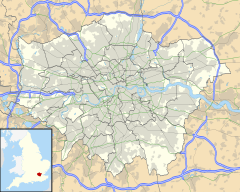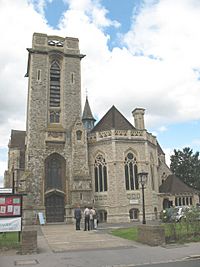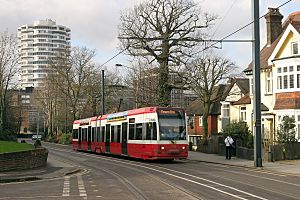Addiscombe facts for kids
Quick facts for kids Addiscombe |
|
|---|---|
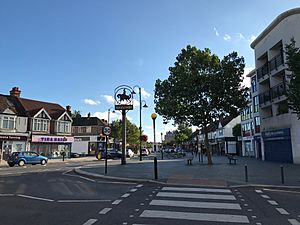 Village sign and shops on Lower Addiscombe Road |
|
| OS grid reference | TQ345665 |
| • Charing Cross | 9.1 mi (14.6 km) NNW |
| London borough | |
| Ceremonial county | Greater London |
| Region | |
| Country | England |
| Sovereign state | United Kingdom |
| Post town | CROYDON |
| Postcode district | CR0 |
| Dialling code | 020 |
| Police | Metropolitan |
| Fire | London |
| Ambulance | London |
| EU Parliament | London |
| UK Parliament |
|
| London Assembly |
|
Addiscombe is a lively area in south London, England. It's part of the London Borough of Croydon. You can find it about 14.6 kilometers (9.1 miles) south of Charing Cross, which is a famous spot in central London. Addiscombe is located near other areas like Croydon town centre, Shirley, and Woodside.
Contents
What's in a Name?
The name Addiscombe likely comes from old Anglo-Saxon words. It probably means "Eadda or Æddi's estate." Eadda or Æddi was an Anglo-Saxon person's name. The word camp meant an enclosed area in Old English. It's thought that the same person might have also given their name to Addington, which is a couple of miles south.
A Look Back in Time
Addiscombe was first mentioned in the 1200s. Back then, it was known as land belonging to someone named Eadda. For a long time, it was mostly a countryside area with lots of trees. The main jobs here were farming and making bricks. Clay from nearby Woodside was used to make the bricks.
Addiscombe Place: A Grand House
In 1703, a grand house called Addiscombe Place was built. It was designed by a famous architect, Sir John Vanbrugh. This house was one of the three most important houses in Addiscombe. It replaced an older mansion from the 1500s.
Many important people visited Addiscombe Place. These included George III, who was King of Great Britain, and Peter the Great of Russia. Peter the Great is even said to have planted a cedar tree in Mulberry Lane to remember his visit!
Addiscombe Military Seminary: A School for Officers
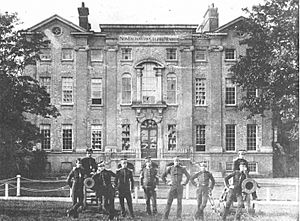
In 1809, Addiscombe Place became a special military school. It was called the Addiscombe Military Seminary. Here, young men were trained to become officers for the British East India Company. This company was very powerful and traded with India. The school taught them how to be good leaders in the army.
However, after a big event in India called the Indian Mutiny of 1857, the British government took over the East India Company. Because of this, the military school closed in 1861. The students who were still there moved to another military college.
Most of the school buildings were later pulled down in 1863. New roads were built on the land. These roads were named after important people from British India, like Outram, Havelock, and Canning. Today, only a few buildings from the old seminary remain.
Addiscombe Grows Up
When railways started in the 1830s, Addiscombe began to change. More houses were built, especially after the military college closed in 1858.
Churches were also built as the population grew. St James' Parish Church was built in 1829. Later, in 1870, the church of St Paul's opened, which was later renamed St Mary Magdalene.
By the 1930s, most of the empty land in Addiscombe had been filled with new homes. The old Addiscombe railway station closed in the late 1990s and was also replaced by houses.
Addiscombe Today
Today, Addiscombe is a busy residential area. It has several lovely parks and green spaces, like Ashburton Park and Addiscombe Recreation Ground. The main shopping area is along Lower Addiscombe Road. Here you can find many different shops, restaurants, and pubs.
Sporting Life
Addiscombe is home to several sports clubs:
- Addiscombe Hockey Club, for field hockey.
- Addiscombe Cricket Club, started in 1866.
- Addiscombe Cycling Club, started in 1929.
Getting Around
Addiscombe is well-connected by the Tramlink system. There are four tram stops in the area: Lebanon Road, Sandilands, Addiscombe, and Blackhorse Lane. Sandilands was the site of a tram accident in 2016, and there is a memorial there.
The old Addiscombe railway station closed in 1997. Part of the old railway track is now a park called Addiscombe Railway Park. The closest train station today is East Croydon.
Famous Faces from Addiscombe
Many interesting people have lived in Addiscombe:
- Frederick G. Creed (1871-1957): An electrical engineer who invented the teleprinter. You can see a special blue plaque on his old house.
- R. F. Delderfield (1912–1972): A writer whose books were often made into TV shows.
- Matthew Fisher: The organ player for the famous band Procol Harum.
- D. H. Lawrence (1885–1930): A well-known author who lived in Addiscombe while he was a teacher.
- Kate Moss: A world-famous model who grew up here.
- Paul Nihill: An Olympic athlete who won a silver medal in race walking in 1964. A place is named after him!
- David Prowse (1935–2020): The actor who played Darth Vader in the original Star Wars movies.
Gallery
 | Kyle Baker |
 | Joseph Yoakum |
 | Laura Wheeler Waring |
 | Henry Ossawa Tanner |


